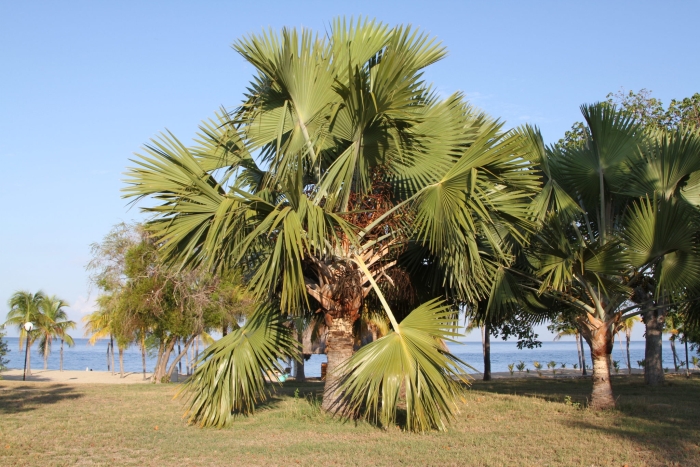Puerto Rico Palmetto
(Sabal causiarum)
Puerto Rico Palmetto (Sabal causiarum)
/
/

© Brian Oakes Haiti Hunter
CC BY 4.0
Image By:
© Brian Oakes Haiti Hunter
Recorded By:
Copyright:
CC BY 4.0
Copyright Notice:
Photo by: © Brian Oakes Haiti Hunter | License Type: CC BY 4.0 | License URL: http://creativecommons.org/licenses/by/4.0/ | Uploader: haiti_hunter_brian_oakes | Publisher: iNaturalist |

























Estimated Native Range
Summary
Sabal causiarum, commonly known as the Puerto Rico palmetto or Puerto Rican hat palm, is a slow-growing, evergreen palm native to coastal plains, dry forests, and sandy areas of Hispaniola (Dominican Republic and Haiti), Puerto Rico, and the British Virgin Islands. It can reach up to 33 feet in height with stout, smooth stems 14-28 inches in diameter. The palm has a crown of 20-30 large, costapalmate leaves, each with 60-120 stiff, fan-shaped leaflets. The Puerto Rico palmetto is notable for its large, white inflorescences that give way to globose black fruits, each about 0.5-0.6 inches in diameter, which are an important food source for wildlife.
The Puerto Rico palmetto is valued for its durability and low maintenance requirements, making it a popular choice for urban planting, as a specimen tree in gardens, and for coastal landscaping due to its salt tolerance. It thrives in full sun to partial shade and prefers well-drained soils, though it is adaptable to various soil types. This palm is drought-tolerant once established and requires minimal supplemental watering. The leaves have historically been used for crafting hats, baskets, mats, and hammocks, particularly in the hat-making industry that once flourished in Joyuda, Cabo Rojo. While it is not prone to serious pest or disease problems, scale insects and palm weevils can occasionally be an issue. The species is not known to be invasive outside its native range.CC BY-SA 4.0
The Puerto Rico palmetto is valued for its durability and low maintenance requirements, making it a popular choice for urban planting, as a specimen tree in gardens, and for coastal landscaping due to its salt tolerance. It thrives in full sun to partial shade and prefers well-drained soils, though it is adaptable to various soil types. This palm is drought-tolerant once established and requires minimal supplemental watering. The leaves have historically been used for crafting hats, baskets, mats, and hammocks, particularly in the hat-making industry that once flourished in Joyuda, Cabo Rojo. While it is not prone to serious pest or disease problems, scale insects and palm weevils can occasionally be an issue. The species is not known to be invasive outside its native range.CC BY-SA 4.0
Plant Description
- Plant Type: Tree
- Height: 20-40 feet
- Width: 10-15 feet
- Growth Rate: Slow
- Flower Color: White
- Flowering Season: Summer
- Leaf Retention: Evergreen
Growth Requirements
- Sun: Full Sun, Part Shade
- Water: Medium
- Drainage: Fast, Medium
Common Uses
Bird Garden, Drought Tolerant, Low Maintenance, Salt Tolerant
Natural Habitat
Native to coastal plains, dry forests, and sandy areas of Hispaniola, Puerto Rico, and the British Virgin Islands
Other Names
Common Names: Puerto Rican Palmetto , Large-Leaf Fountain Palm , Puerto Rico Palmetto , Yarey
Scientific Names: Sabal causiarum , Inodes causiarum , Inodes glauca , Sabal haitensis , Sabal haitensis , Sabal haitensis , Sabal questeliana
GBIF Accepted Name: